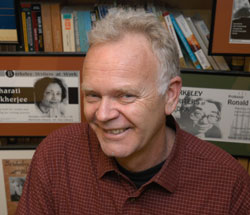Berkeleyan
Campus inkslingers reveal trade secrets
Scholars talk shop in Berkeley Writers at Work interviews
![]()
| 04 February 2004
| |  Steve Tollefson helped launch the Berkeley Writers at Work interview series in 1997 Peg Skorpinski photo |
“I want the students and staff here to get some confidence about their writing abilities,” says Steve Tollefson. “It’s helpful for them to hear that published writers struggle too.”
Tollefson, a lecturer in College Writing Programs (CWP), helped launch the Berkeley Writers at Work series in 1997 as a means for everyone on campus who writes — students, faculty, and staff — to discuss and demystify the creative process.
The College Writing Program, part of Undergraduate and Interdisciplinary Studies in the College of Letters & Science, calls itself “a resource on writing and writing instruction to UC Berkeley.” CWP lecturers Jane Hammons, Kaya Oakes, Gail Offen-Brown, and Maggie Sokolik bear that out with Berkeley Writers at Work, taking turns conducting interviews with the campus writers who participate.
Tollefson himself enjoys interviewing many of them as well, and he tries to read every book and article by his subjects that he can find beforehand. After being interviewed, Frederick Crews, a professor emeritus of English who has skewered pretentious literary theories (as well as Sigmund Freud) in his books, told Tollefson, “You probably know my work better than I do.”
Tollefson and his colleagues routinely have their students attend the talks as part of their classwork. Though the program was not created to be an assignment for CWP students, Tollefson hopes they learn that “no one writes a perfect first draft. All of these writers talk about the endless revision process.
“Both Fred Crews and Orville Schell [dean of the Graduate School of Journalism] say that you need a really vicious friend or an editor who will not feel obliged to tell you that your writing is nice,” Tollefson continues. “As Fred says, ‘You should get to the point where you don’t need to have the nice things said, because if it’s already good, what is there to say about it?’”
First-draft lessons
Berkeley Writers at Work hosts nonfiction authors primarily — the sort who, Tollefson says, are rarely asked to talk about their writing process but instead are expected to be authorities on their books’ subjects.
In the eight-year history of the interview series, only one fiction writer has been asked to participate: Professor of English Bharati Mukherjee, a widely published author. “For any of her work, whether it’s a short story or a novel, she says that she writes a first draft,” reports Tollefson, “and then she never looks at it again. She uses that draft as a way to get going. There’s a great lesson for the rest of us in that.”
Tollefson always asks about the circumstances in which writers work. “Fred Crews likes to write in his little place in the mountains surrounded by quiet,” he says. “He told me he would never have cable there, because he knows he would succumb.”
Mukherjee, on the other hand, has a television tuned to CNN or MSNBC in every room when she’s working on her final draft, says Tollefson, “because, she says she just needs ‘that hit of news.’”
Similarly, “[Professor of Linguistics] Robin Lakoff gets going at home, scheduling her writing around what’s on Oprah that afternoon and other important commitments,” reveals Tollefson. “Of course you had to have seen the interview to see her smile as she said that. But it’s true that not everyone sits around in a quiet, book-filled room,” he says, “and almost everyone procrastinates.”
The next Berkeley Writers at Work interview is scheduled for Tuesday, March 30, from noon to 1:30 p.m. in Doe Library’s Morrison Room. John Levine, a College Writing Programs lecturer, will interview public policy professor David Kirp, author of Shakespeare, Einstein, and the Bottom Line: The Marketing of Higher Education.
“It’s such an important book for a place like Berkeley,” says Tollefson. “I think everyone on campus should read it … and then come to the interview.”

